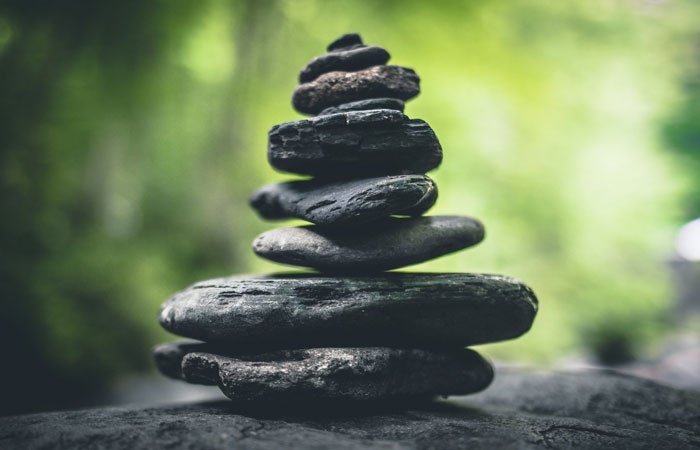Tips & advice for discovering your spirituality and beginning your journey to live a more fulfilling, happy, and spiritually guided life.
Spirituality Looks & Feels Different for Everyone …
Spirituality can be defined as a sense of connection to something higher than ourselves. Many people search for meaning in their lives. The sense of transcendence experienced in spirituality is a universal experience
While the understanding of spirituality differs across religions and belief systems, it can be described as finding meaning and purpose in life. Religion and spirituality are not understood in the same way, though they often overlap. Spirituality describes a much broader understanding of an individual’s connection with the transcendent aspects of life.
Why Practise Spirituality?
Daily spiritual practices might not provide the explanations we want today, right now, or possibly ever. Still, daily spiritual practice has many positive benefits on health and well-being. Small, everyday rituals can bring comfort, create better lifestyle habits, and set positive intentions while slowly uncovering a deeper purpose.

How To Explore Your Spirituality
1. Set your intention.
The first step in establishing a spiritual practice is acknowledging that you actually want one in the first place. Your intention can be as simple as saying to yourself, “I want to learn more about spirituality in general”, or it could be as formal as creating a ritual to mark your start on this life-long journey. Acknowledging your desire and curiosity, even if it’s only for yourself, is like opening the door and setting your feet on the path to spirituality.
2. Educate yourself.
Read everything you can get your hands on about spirituality. Watch documentaries, talk to people, and read blogs! Knowledge and curiosity are the foundations of a truly rich spiritual journey.
3. Be still every day.
Most spiritual traditions include some type of formalized stillness practice, such as meditation, chanting, or mindfulness. A great way to establish a strong spiritual practice is to set aside time every day to intentionally quiet your thinking mind. There is a tonne of free resources available online to get you started. Pema Chödrön and Tara Brach are two of my favourite teachers.
4. Don’t neglect your meat suit.
Mind, body, and spirit are not separate so don’t forget to employ your physical body in your pursuit of spirituality. Dancing, drumming, yoga, singing, walking, and even playing sports are deeply intuitive, bodily ways of expressing our spiritual selves. Not to mention great exercise and a lot of fun.
5. Approach your practice with playfulness.
Your spiritual practice does not have to be solemn and serious. Approach your practice with a light heart, laugh at yourself, laugh at your teachers, and laugh at the sheer silliness that is the human experience.
6. Watch for signs.
As you begin to cultivate a spiritual practice you may find that the universe sends you little nudges or clues to encourage you on your journey. You may begin to notice strange coincidences or undeniable signs that point you deeper into your connection with spirit. It may be something as simple as having three different people recommend the same book, or connecting with a kindred spirit through a seemingly random occurrence. Look out for them and use them as motivation and validation on your journey.
7. Connect with your tribe.
Want to feel your practice really open up? Get together with other seekers. Attend workshops, classes, and retreats. Join online communities. It doesn’t have to be a formal gathering. It can be any circle of individuals who support and encourage each other on this ride we call life.
8. Experiment.
The best thing about building your spiritual practice is that it is yours. You alone get to choose what works for you. And there are no rules so don’t be afraid to explore. Cherry-pick from any discipline, idea, or philosophy that speaks to you. Try everything and trust your gut. Whatever fuels your interest, resonates with your heart, and feeds your soul…do that!

Tips For Practising Spirituality
– Start the Day With a Short Meditation or Prayer
Whether that means reciting a prayer, practicing a quiet moment of mindfulness, or listening to a guided meditation, setting aside a few minutes in the morning to connect with ourselves and set positive intentions will encourage a peaceful, grateful mindset for a successful day in line with your spiritual values.
– Go for a Walking Meditation
Spiritual practice doesn’t necessarily have to mean visiting a temple or performing a complex ritual. Walking in a purposeful and conscious way can also become a spiritual practice. It gives a chance to clear the mind and reflect. You can use it as an opportunity to take a break from the hustle of bustle and reconnect with yourself.
– Take Short Spirit Breaks Throughout the Day
Regular breaks throughout the day help improve health, wellness, and performance in work. They also provide an opportunity to have a short, calming meditation or prayer. That can mean a simple yoga stretch with deep breathing, sitting outside of the office in the sunshine for 5 minutes, or simply mentally recounting a prayer.
– Count Your Blessings
While a saying like “count your blessings” sounds cliche, it does send a powerful message. Many teachings prescribe gratitude as the antidote to negative emotions like greed, anger, and envy. Keeping a regular gratitude journal or simply reflecting on the good people or things going well in your life represents a simple daily spiritual practice that can help to harness the many benefits of gratitude.
– Incorporate Spirituality Into Your Daily Routine
Many religions teach people to find meaning and meditation in everyday life, whether it means working hard to support a family, helping others at home or work, or appreciating every meal. That can even mean finding joy in the mundane, like walking to the bus stop or cleaning the house. Celebrating even the smallest things can bring meaning to your life every day and help to live with a sense of vitality and purpose.
– Have Patience and Dedicate Yourself to Finding Your Own Path
Have you ever heard the saying, “You should sit in meditation for twenty minutes every day unless you’re too busy? Then you should sit for an hour.” That may sound frustrating at first, but it doesn’t have to be taken quite so literally. You could interpret that, instead, as to say: If something is easy for you, work on it a little. If it’s hard for you, work on it a lot. Dedicating time to spirituality may not feel easy at first, but staying dedicated can bring many benefits to living a joyful, meaningful life.
Helpful Resources:
– 101 Ways to Transform Your Life – Wayne Dyer
– On Being – Krista Tippet
– Jay Shetty’s YouTube Channel
– Mass Meditation – Aaron Doughty
– Karma Explained – Evan Carmichael
– Treatise of Revolutionary Psychology – Samael Aun Weor


